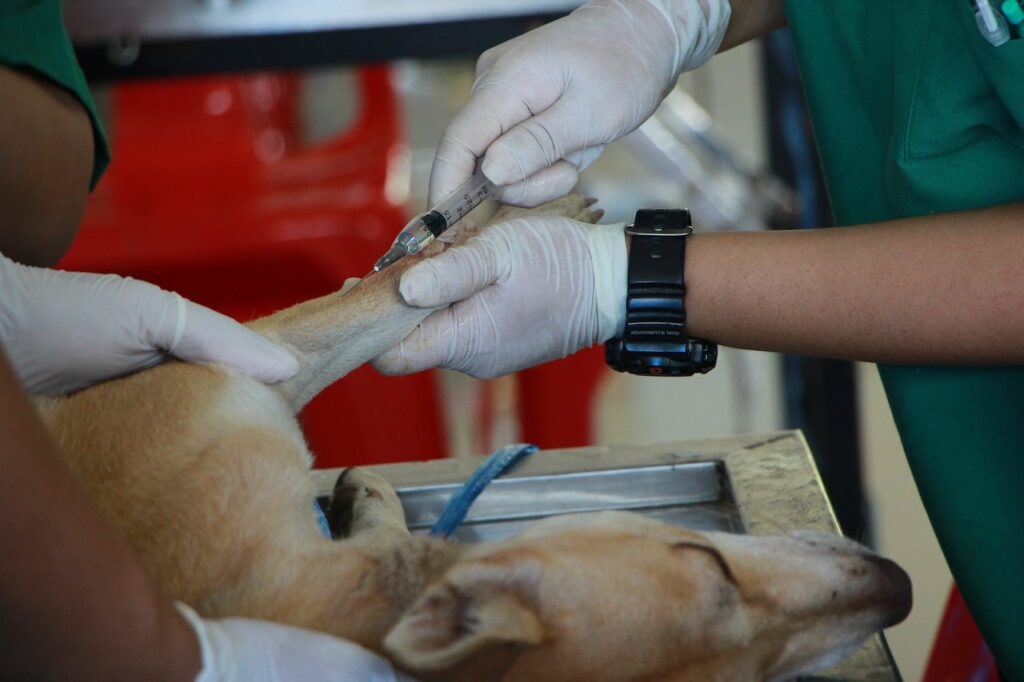Anti-Sickness Injections for Dogs: When Your Furry Friend Needs a Helping Hand
Dogs are beloved members of many households. They’re part of the family and an important source of comfort and joy for their owners. That’s why, when your canine companion is feeling under the weather, it can be heartbreaking to watch them suffer in silence. Fortunately, treatments available can make them feel better and get them back to their usual selves. One of those treatments is anti-sickness injections for dogs.
If you’re a dog owner, you know that your furry friend can sometimes get sick. It’s important to administer anti-sickness injections as soon as possible. In this article, we’ll tell you everything you need to know about them.
What Are Anti-Sickness Injections?
Anti-sickness injections for dogs are specialised medications that help reduce the severity of symptoms associated with sickness. The injection will contain one or more active ingredients approved by the U.S. Food and Drug Administration (FDA).
Commonly used ingredients include:
- metoclopramide, which helps reduce vomiting.
- ondansetron, which helps reduce nausea.
- dexamethasone, which reduces inflammation caused by sickness.
These anti-sickness injections are typically administered directly into a vein (intravenously). However, they may also be given through an intramuscular route, such as into the shoulder muscle or under the skin.
Benefits of Anti-Sickness Injections
The benefits of anti-sickness injections for dogs include a reduction in pain and discomfort from symptoms associated with sickness, such as vomiting, diarrhoea, fever and loss of appetite. Additionally, these injections can help increase appetite so your dog can start to eat again after not doing so due to their illness or condition. Finally, these injections can expedite healing so your furry friend can return to their usual activity sooner rather than later.
Risks Associated With Anti-Sickness Injections
As with any medical procedure or treatment, there are risks associated with administering anti-sickness injections to dogs. This includes potential allergic reactions to some components in the medication and possible side effects such as increased thirst or urination. It is important to consult a veterinarian before deciding whether this treatment is right for your pet to weigh the benefits against any potential risks.
Administration Instructions
When administering anti-sickness injections for dogs at home, it is important to follow instructions carefully and pay attention to details provided by your veterinarian so that you do not risk harming your pet further. Typically you will need sterile equipment such as needles and syringes to administer an intravenous injection properly, as well as clean hands and surfaces before administration. Additionally, you may need special tools like swabs or alcohol solutions to ensure that all equipment is practically sterile before using it on your pet’s skin or body cavity area where applicable. Finally, store all supplies away from children’s reach until you’re ready to use them again on your dog if necessary.
Things To Keep In Mind Before Administering Anti-Sickness Injections For Dogs:
1) Follow all instructions carefully provided by your veterinarian before administering medication
2) Properly sterilise equipment beforehand using appropriate techniques such as boiling water or alcohol solutions
3) Take extra caution when administering through an intramuscular route, such as into the shoulder muscle or under the skin
4) Make sure all necessary supplies, such as needles and syringes, are stored away from children’s reach until the next use
5) Pay attention to signs of allergic reactions immediately after administration, just in case
Questions To Ask Your Veterinarian
- What type of dog anti-sickness injection should I use?
It all depends on why you’re giving it to your pup. Generally, anti-sickness injections contain antiemetics (medicines designed to stop nausea) to reduce the symptoms of an upset stomach and other similar gastrointestinal issues. Due to cancer treatments, anti-sickness injections can help treat various ailments, such as motion sickness, nausea, or vomiting.
When administering anti- Due to cancer treatments, anti-sickness injections can help treat various ailments, such as motion sickness, nausea, or vomiting.sickness injections for dogs, it is important to know the dosage recommended for your pet’s size and age. Ensure you follow the instructions carefully and only administer the injection when necessary.
- Are there any potential side effects or risks associated with the injection?
Yes, anti-sickness injections can cause side effects in dogs, as with any medication. Possible side effects include diarrhoea, vomiting, drowsiness, and restlessness. If you notice that your pup is having an adverse reaction to the injection, seek medical attention immediately.
Overall anti-sickness injections for dogs are a great way to help reduce nausea and vomiting due to various ailments. With careful consideration, these injections can bring relief to many canine illnesses! It’s important to talk with your vet before administering any anti-sickness injection and ensure you understand the dosage requirements for your pet’s size and age.
- How often will the injections need to be administered?
The frequency of anti-sickness injections for dogs depends on the severity of the ailment. For example, motion sickness may require multiple doses throughout the day, while nausea associated with cancer treatment may only need one dose each day. It is important to discuss any dosing instructions with your vet and make sure you follow those instructions carefully.
Wrap Up
Anti-sickness injections for dogs can relieve sickness symptoms and help them return to their usual activities more quickly. However, it is important to consult your veterinarian beforehand. By following all instructions carefully and being aware of any potential risks or side
If you’re concerned about the costs of anti-sickness injections or other veterinary treatments, make sure your pup is covered with Furrr.co.uk pet insurance. With a range of policies to suit your needs and budget, Furrr.co.uk can help give you peace of mind that your precious pooch has the protection they need should any unexpected medical bills arise. Visit our website today to get your pup insured!










